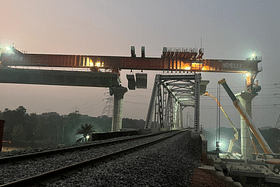Snapshot
-
The target is to operate RRTS trains in the 17-km-long priority section in March this year. To achieve this goal, the priority section is being constructed at a fast pace.
The Regional Rapid Transit System (RRTS) corridor in Meerut has successfully crossed the Eastern Dedicated Freight Corridor (EDFC) over the Delhi-Meerut road at a height of about 22 metres.
This will be the only place on the 82-km-long Delhi-Ghaziabad-Meerut RRTS corridor where the Indian Railways and RRTS trains will pass simultaneously over a busy roadway.
Under the process, segments of viaduct spans have been installed on the EDFC. The RRTS corridor is crossing the EDFC in the Mohiuddinpur area of Meerut.
After crossing the border of Modi Nagar on Delhi-Meerut road, the EDFC is crossing Delhi-Meerut road just before Meerut South station. The goods trains of the Indian Railways will pass through this corridor.
The Delhi-Meerut road is at the bottom, EDFC above that, and RRTS corridor is on top.
The height of the RRTS pillars has also been increased to cross the EDFC. The segments of the viaduct span have been installed on the two pillars constructed on both sides of the EDFC. The two pillars are separated by 34 metres.
The process was completed on the Delhi-Meerut road with the help of the traffic department. During this process, the flow of vehicles remained normal in the area.
Launching gantry, constructing viaduct from the Modi Nagar side has crossed the EDFC, and now the viaduct will be constructed towards the Meerut South station. With the installation of this span, the viaduct construction in the direction of Meerut has reached the next stage.
The Meerut South station will be important as metro trains will facilitate travel for the people of Meerut.
After the Meerut South station, Meerut Metro will have Partapur, Rithani, Shatabdi Nagar, Brahmapuri, Meerut Central, Bhainsali, Begumpul, MES Colony, Daurli Meerut North Modipuram, and Modipuram Depot stations on the corridor.
It is noteworthy that the target is to operate RRTS trains in the 17-km-long priority section in March this year. To achieve this goal, the priority section is being constructed at a fast pace.
The National Capital Region Transport Corporation (NCRTC) is implementing India’s first RRTS, which is a rail-based, high-speed, high-frequency regional commuter transit system.
It has a design speed of 180 kilometres per hour (kph) and an average speed of 100 kph. Powered by electric traction, RRTS will serve as a green mode of transit in the National Capital Region (NCR). It aims to reduce greenhouse gas emissions and pollution in the NCR.
- ,


